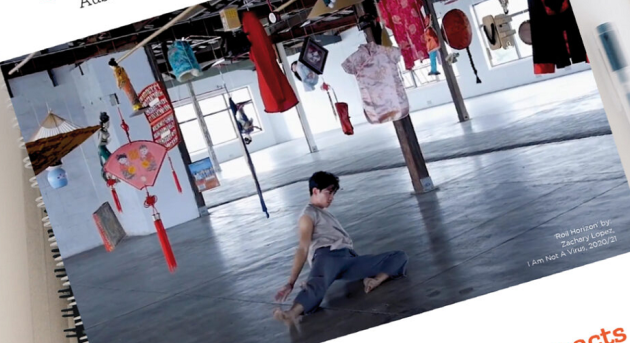LOST WORK 2.0: The impacts of the pandemic on creatives of colour and first nations creatives
The results of a second national survey of around 200 First Nations and CaLD people and organisations in the creative sector reveals that during the COVID-19 pandemic, most are experiencing a loss of work, increased racism, stress, anxiety and depression, and an inability to pay bills, rent and their mortgage.
Lost Work 2.0 Report: The impacts of the pandemic on creatives of colour and First Nations creatives’ is an updated version of a poll conducted by Diversity Arts Australia (DARTS) in March 2020. Run from March 29-May 31, 2021, Survey 2.0 sought to understand the effects of COVID on individuals and organisations from the creative sector: visual arts, music, performing arts, screen and more. In the era of Bla(c)k Lives Matter and with a documented rise in anti-Asian racism, respondents were asked about the challenges for First Nations, culturally diverse, POC, migrant and refugee artists and organisations representing these communities, and how DARTS and our partners might provide support. A significant 35% of Survey 2.0 respondents identified as Aboriginal and/or Torres Strait Islander.
Over 79% of respondents said they have lost or expected to lose income as a result of COVID, with a staggering 85% of First Nations respondents indicating they had lost or expected to lose income due to COVID. Accordingly, DARTS has consulted with BlakDance and Koorie Heritage Trust in making recommendations for the specific needs of First Nations artists and creative workers. Income loss has far-reaching implications for First Nations and CaLD creatives, many citing worsening precarity and increased job cancellations due to public health orders.
BlakDance and Diversity Arts Australia Board Member, Professor Nareen Young:
For First Nations artists, support needs to be increased and targeted towards small-medium First Nations-led businesses who are often doing the heavy lifting in ensuring artists are employed.
Further to this, First Nations artists and creative workers need to be platformed and engaged, and procurement policies need to be put in place to ensure the sector can facilitate ethical Indigenous creative control over our art and storytelling. The arts must embed anti-racism into its policies and practices.
Respondents acknowledged that racism has increased during the pandemic. Over 53% of respondents reported they had experienced racism prior to the COVID-19 pandemic and of those, over 72% believed racism to have gotten worse during the COVID-19 context.
Critically, respondents provided insights into the kinds of support they are now seeking. Grants and government financial assistance were most often mentioned when respondents were asked what would help them. Many creatives also mentioned ongoing, paid, secure work, along with mentoring opportunities, advocacy, and relationship building.
Lena Nahlous, DARTS Executive Director:
The results of Report 2.0 indicate there is an urgent need for support and investment in First Nations and culturally diverse artists, filmmakers and arts workers at this time, Our previous research already tells us that there was a significant underrepresentation of culturally diverse artists prior to the pandemic, and this has been further exacerbated over the past two years. We call on the Federal and state governments, organisations and philanthropy to provide support so the creative sector can withstand and adapt to the pandemic’s unpredictable ripple effects.
As one survey respondent stated:
I think we won’t know the full extent of the impact until down the line. Effects have not been immediate, but a lot of the programs we report against for our funding have been severely affected by COVID and we will need to rebuild.
Summary of Key Findings
- Most respondents lost income due to the pandemic. 79.1% of respondents have lost or expect to lose income as a result of COVID-19. First Nations respondents indicated higher rates of lost income at 85.3%.
- Women are slightly more likely to have lost income during the pandemic. For female respondents, 79.1% indicated they lost income, compared to 67.9% of men. 16.5% indicated this was more than half their usual income.
- Income loss has had far-reaching implications for diverse creatives, with many citing worsening precarity and increased job cancellations due to public health orders.
- Financial insecurity is rife amongst diverse creatives. Concerningly, around half of respondents indicated that they had experienced problems paying their rent or mortgage, their bills and medical care.
- Financial support provided during the pandemic has provided some respite to respondents. In particular, JobKeeper or JobSeeker support from the Australian government was accessed by 44% of respondents.
- Racism is common and has increased during the pandemic. 53.4% of respondents reported they had experienced racism prior to the COVID-19 pandemic. Most (72.3%) believe it to have gotten worse during the COVID-19 context.
- Racism continues to deeply affect creatives of colour and First Nations creatives. Asian/Asian Australian respondents have shared stories of increased racism due to the racialisation of COVID-19. Creatives of colour who participated in our survey experienced hyper-surveillance and the policing of their behaviours, but they also noted that racism is not new and is ingrained in the structures of Australian society (including the arts).
- The arts and creative sectors have had their processes and practices impacted by the Black Lives Matter (BLM) movement, which comes to an extra burden for First Nations and Black artists, creative workers and organisations.
- Emotional wellbeing and mental health in the COVID-19 context is of grave concern. Respondents reported much lower levels of ability to “snap back” after the onset of the COVID-19 pandemic compared to pre-COVID levels.
- Grants and government financial assistance were often mentioned when respondents were asked what would help them. Ongoing and paid, secure work, mentoring opportunities, advocacy, and relationship building are crucial to respondents.
For more information click HERE



